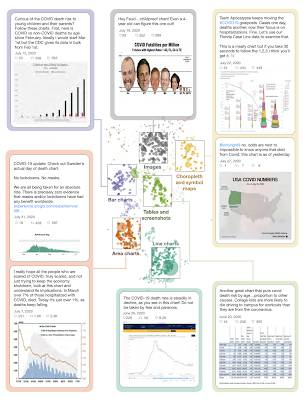
A recent paper on the MIT website entitled "Viral Visualizations: How Coronavirus Skeptics Use Orthodox Data Practices to Promote Unorthodox Science Online" by Crystal Lee et al examines how coronavirus skeptics use data visualizations which are then posted on social media accounts showing that governments' response to the pandemic was excessive. Here is a summary of the goals of the study:
"This paper investigates how pandemic visualizations circulated on social media, and shows that people who mistrust the scientific establishment often deploy the same rhetorics of data-driven decision- making used by experts, but to advocate for radical policy changes. Using a quantitative analysis of how visualizations spread on Twitter and an ethnographic approach to analyzing conversations about COVID data on Facebook, we document an epistemological gap that leads pro- and anti-mask groups to draw drastically different inferences from similar data. Ultimately, we argue that the deployment of COVID data visualizations reflect a deeper sociopolitical rift regarding the place of science in public life."
It is important to note that the authors of the study use the term "anti-masker" to represent individuals and groups that are in opposition to the norms of the mainstream public sphere (i.e. the lamestream media). They also note that anti-maskers can be described as "counterpublic", that is, the organize themselves into groups that are in opposition to mainstream civic discourse.
Here is an additional quote from the paper with bolds being mine:
"In approaching anti-maskers as a counterpublic (a group shaped by its hostile stance toward mainstream science), we focus particular attention on one form of agentive media production central to their movement: data visualization. We define this counterpublic’s visualization practices as “counter-visualizations” that use orthodox scientific methods to make unorthodox arguments, beyond the pale of the scientific establishment. Data visualizations are not a neutral window onto an observer-independent reality; during a pandemic, they are an arena of political struggle.
Among other initiatives, these groups argue for open access to government data (claiming that CDC and local health departments are not releasing enough data for citizens to make informed decisions), and they use the language of data-driven decision-making to show that social distancing mandates are both ill-advised and unnecessary. In these discussions, we find that anti-maskers think carefully about the grammar of graphics by decomposing visualizations into layered components (e.g., raw data, statistical transformations, mappings, marks, colors). Additionally, they debate how each component changes the narrative that the visualization tells, and they brainstorm alternate visualizations that would better enhance public understanding of the data. This paper empirically shows how COVID anti-mask groups use data visualizations to argue that the US government’s response (broadly construed) to the pandemic is overblown, and that the crisis has long been over.
The authors investigated how anti-mask and anti-lockdown activists use the rhetoric of scientific rigour to oppose these public health measures. These activists do not ignore scientific evidence in their arguments, rather, they use "counter-visualizations" by using orthodox methods to make unorthodox arguments that challenge the governments' narrative that the pandemic is urgent and ongoing. The authors examined data visualizations through two methods:
1.) quantitative analysis of close to half a million tweets that used data visualizations to discuss the pandemic out of a set of over 390 million tweets spanning the period between January 21, 2020 and July 31, 2020. The researchers processed over 41,000 images, many of which are quite professional in their presentation. This was supplemented with a six month-long observational study of anti-mask groups on Facebook, extending from March to September 2020 which provided researchers with an overview of what online discourse about data and its visual representation looks like both inside and outside anti-mask groups. The researchers followed five Facebook groups, each with a range of followers between 10,000 and 300,000, collecting posts that included terms for coronavirus and visualization
2.) qualitative analysis of anti-mask groups provided researchers with a view of how these groups leverage the language of scientific rigour (i.e. criticizing data sources, stating the limitations of specific models) to support ending public health restrictions.
Here are some examples of counter-visualizations from the coronavirus skeptics user network:
Now, let's look at what the research discovered as quoted from the article again with all bolds being mine:
"Anti-maskers have deftly used social media to constitute a cultural and discursive arena devoted to addressing the pandemic and its fallout through practices of data literacy. Data literacy is a quintessential criterion for membership within the community they have created. The prestige of both individual anti-maskers and the larger Facebook groups to which they belong is tied to displays of skill in accessing, interpreting, critiquing, and visualizing data, as well as the pro-social willingness to share those skills with other interested parties. This is a community of practice focused on acquiring and transmitting expertise, and on translating that expertise into concrete political action. Moreover, this is a subculture shaped by mistrust of established authorities and orthodox scientific viewpoints. Its members value individual initiative and ingenuity, trusting scientific analysis only insofar as they can replicate it themselves by accessing and manipulating the data firsthand. They are highly reflexive about the inherently biased nature of any analysis, and resent what they view as the arrogant self-righteousness of scientific elites.
As a subculture, anti-masking amplifies anti-establishment currents pervasive in U.S. political culture. Data literacy, for anti-maskers, exemplifies distinctly American ideals of intellectual self-reliance, which historically takes the form of rejecting experts and other elites. The counter-visualizations that they produce and circulate not only challenge scientific consensus, but they also assert the value of independence in a society that they believe promotes an overall de-skilling and dumbing-down of the population for the sake of more effective social control. As they see it, to counter-visualize is to engage in an act of resistance against the stifling influence of central government, big business, and liberal academia.
It is pretty hard to argue with the 'dumbing-down of the population" given how many people get what little news they access on a daily basis from their social media news feeds or the mainstream media which has proven itself to be little more than a mouthpiece for governments during the pandemic. One need only look at the complete lack of media coverage regarding the concept of cycle thresholds for RT-PCR tests to understand how many of the COVID-positive tests are invalid to gain a sense of the mainstream media's complicity.
Let's close with a quote from the paper's conclusions:
"…the CDC’s initial public messaging that masks were ineffective—followed by a quick public reversal— seriously hindered the organization’s ability to effectively communicate as the pandemic progressed. As we have seen, people are not simply passive consumers of media: anti-mask users in particular were predisposed to digging through the scientific literature and highlighting the uncertainty in academic publications that media organizations elide. When these uncertainties did not surface within public-facing versions of these studies, people began to assume that there was a broader cover-up….
…Instead of treating increased adoption of data-driven storytelling as an unqualified good, we show that data visualizations are not simply tools that people use to understand the epidemiological events around them. They are a battleground that highlight the contested role of expertise in modern American life."
While governments and the mainstream media are doing their best to dismiss COVID skeptics as ignorant and ill-informed "anti-vaxxers" and in some cases linking them to white supremacy and far-right extremism as shown here:
..in fact, this research shows that COVID skeptics are quite capable of presenting the world with a cogent argument that governments, public health officials, NGOs and Big Pharma should not be trusted to tell us the whole truth and nothing but the truth when it comes to the current pandemic.
You can publish this article on your website as long as you provide a link back to this page.



Be the first to comment